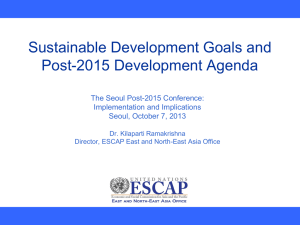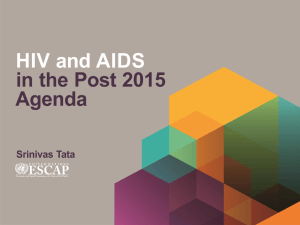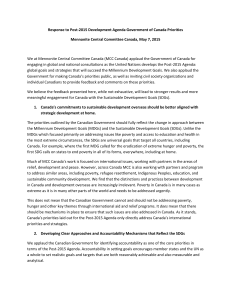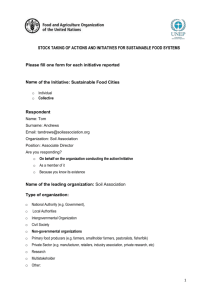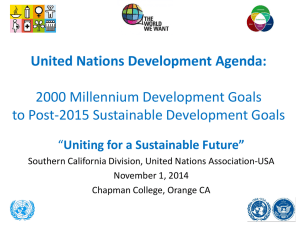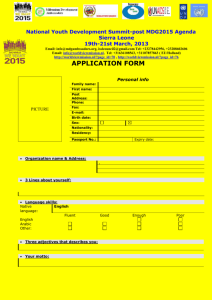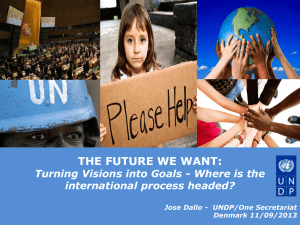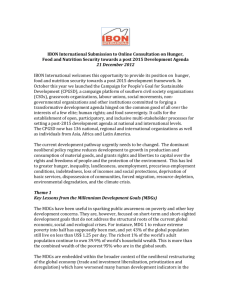Presentation Irish Aid
advertisement
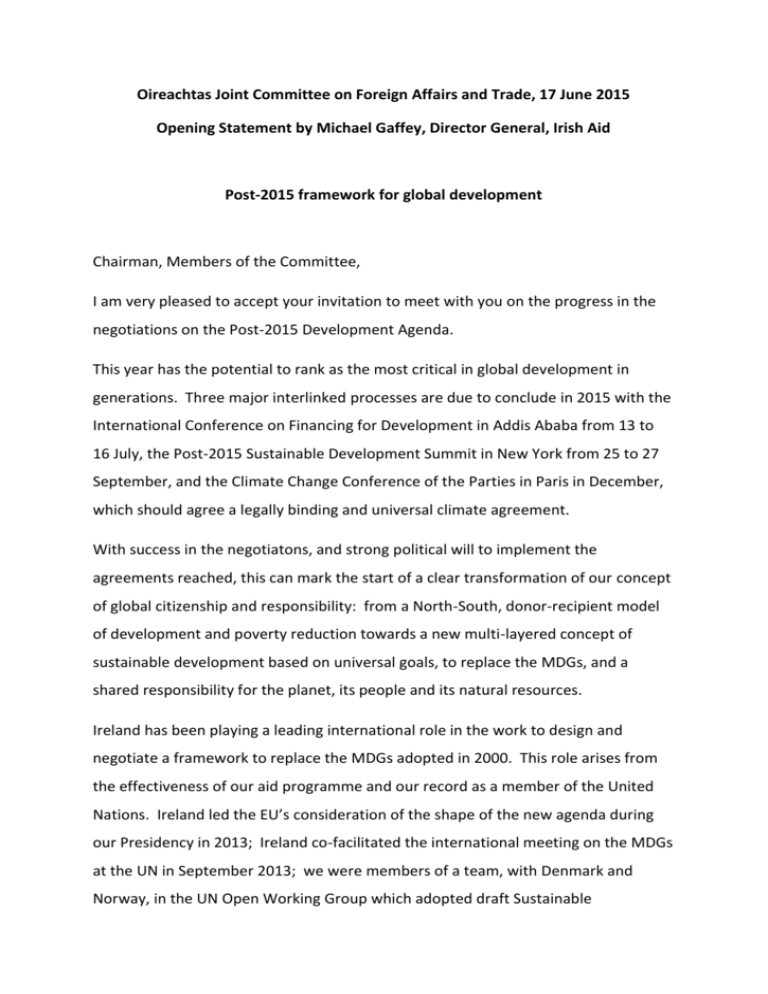
Oireachtas Joint Committee on Foreign Affairs and Trade, 17 June 2015 Opening Statement by Michael Gaffey, Director General, Irish Aid Post-2015 framework for global development Chairman, Members of the Committee, I am very pleased to accept your invitation to meet with you on the progress in the negotiations on the Post-2015 Development Agenda. This year has the potential to rank as the most critical in global development in generations. Three major interlinked processes are due to conclude in 2015 with the International Conference on Financing for Development in Addis Ababa from 13 to 16 July, the Post-2015 Sustainable Development Summit in New York from 25 to 27 September, and the Climate Change Conference of the Parties in Paris in December, which should agree a legally binding and universal climate agreement. With success in the negotiatons, and strong political will to implement the agreements reached, this can mark the start of a clear transformation of our concept of global citizenship and responsibility: from a North-South, donor-recipient model of development and poverty reduction towards a new multi-layered concept of sustainable development based on universal goals, to replace the MDGs, and a shared responsibility for the planet, its people and its natural resources. Ireland has been playing a leading international role in the work to design and negotiate a framework to replace the MDGs adopted in 2000. This role arises from the effectiveness of our aid programme and our record as a member of the United Nations. Ireland led the EU’s consideration of the shape of the new agenda during our Presidency in 2013; Ireland co-facilitated the international meeting on the MDGs at the UN in September 2013; we were members of a team, with Denmark and Norway, in the UN Open Working Group which adopted draft Sustainable Development Goals and targets last year; and Ireland was honoured to be appointed, with Kenya, to co-lead the intergovernmental negotiating process at the UN, with the aim of reaching agreement in July, for adoption at the September Summit. This has involved a major commitment by our Ambassador and his team at the UN, colleagues in Dublin and Limerick, and our mission network worldwide. Ireland’s key priorities for the new goals, throughout the process of the past two years, have been to ensure that they build on progress made over the past 15 years in fighting poverty in all its manifestations under the MDGs. We have focused in particular on the need to galvanise action to end extreme poverty, hunger and undernutrition by 2030; on ensuring there is a single strong goal on gender equality and the empowerment of women; and on the critical role of good governance and the rule of law in building sustainable, prosperous and equitable societies. And we have emphasised the need to incorporate human rights in the new framework, reduce inequality and protect the role of civil society. We believe these priorities will be well-reflected in the outcome. The new Sustainable Development Goals will build on and differ from the Millennium Development Goals in three fundamental ways. 1. The SDG agenda is broader and addresses a wider range of issues. Its aim will be the ending of poverty through sustainable development: addressing social, economic and environmental challenges. The scope of the framework will recognise the interlinkages between issues such as climate change, poverty eradication, peace and security and inequalities. 2. The SDGs have been drafted and negotiated in a radically more inclusive way than the MDGs. They may therefore, initially, seem more unwieldy, but they are comprehensive and address the complexities of development, as it is experienced by people and communities. This insight was a priority outcome of Ireland’s Hunger Nutrition Climate Justice Conference in April 2013. The MDGs were drafted by a group of experts working with the former UN Secretary General. The SDGs will be the product of a global consultation, involving millions of people across the world, and an intergovernmental negotiation. 3. The post-2015 agenda will be a universal one. All countries – developed, middle income and least developed – will have a role in implementing commitments domestically and internationally, with strong mechanisms at national level to monitor progress and report back. This issue of monitoring and review remains a difficult and contentious one in the negotiations. The process will be voluntary. But review will be needed at national, regional and global levels, and a strong monitoring and review process is a priority for the EU. It has emphasised the need for government progress reports to be complemented by contributions from civil society, academia, local government, the UN system and the private sector. We need to examine also the crucial role that Parliaments should play in review processes. Agreement on the financing of the SDGs will be critical to the success of the agenda. The Conference in Addis will aim to reach agreement on financing, extending significantly beyond Official Development Assistance, and covering the financing of infrastructure and climate policies, domestic resource mobilisation, including taxation and tackling illicit financial flows, the role of the private sector and the need to boost world trade in a fair and equitable manner. Ireland has been working to ensure coherence between the Addis and New York processes. ODA will be a vital element, especially for LDCs, but it will be only part of the picture. To illustrate, total ODA last year amounted to some $135 billion. But UNCTAD has estimated that global investment needs required for the achievement of the SDGs are of the order of $5 – 7 trillion. The needs of developing countries alone will be in the region of $3.5 – 4.5 trillion annually, mainly for basic infrastructure, food security, climate change, health and education. If there are some 30 “donor” countries, including Ireland and just over 30 low income countries still dependent on aid, there are some 130 emerging middle income economies that have achieved higher levels of average prosperity. The central issue in Addis must be how to unlock finance from different sources, including but not exclusively aid, to finance sustainable development. ODA will remain essential for the poorest countries under the new framework, including many African countries and fragile states where Ireland focuses its assistance. The Government therefore remain committed to the 0.7% GNP target for ODA and to making further progress towards it as Ireland’s economic recovery consolidates. It is significant that the EU Development Ministers meeting in Brussels on 26 May were able to reach agreement to recommit to reaching the 0.7% target within the timeframe of the post-2015 agenda, and to directing more assistance to Least Developed Countries, especially the poorest countries in Africa, where progress has been slowest on the MDGs. Ireland played a crucial role in brokering agreement at the Council. It is important to note that Ireland is also a world leader in the proportion of our assistance which we provide to the Least Developed Countries, and we are committed to maintaining this approach. Our priorities will be well represented in the 17 Goals and 69 targets which seem likely to be agreed with some minor technical adjustments. Implementation will be voluntary, but the scale of the ambition and of the Summit in New York will aim to generate strong political will to do so. The Government’s development programme, Irish Aid, will continue to focus on the priority areas identified in our policy for sustainable development, One World One Future, which sets out a whole of government approach to our development policy. Many countries, including a number of our EU partners are examining new institutional frameworks at the national level to translate the universal goals and targets into national actions, commitments, responsibilities accountability which respect national priorities and circumstances. These would range beyond the traditional Development Ministry approach, in their focus on domestic implementation. Ireland’s engagement in the process has been guided by strong inter-Departmental coordination, chaired by the Department of Foreign Affairs and Trade. We are now giving consideration to the nature of the institutional framework for national implementation of the SDGs. We are committed, through our aid programme, to providing comprehensive support to Governments, Parliaments and civil society in our key partner countries to facilitate their implementation of the new development agenda. We will retain our focus on the least developed countries and communities in Africa, on the basis of the realistic objective of ending extreme poverty and hunger in the world by 2030. We face this year a once in a generation opportunity to fashion and implement a truly transformative agenda, with the stated commitment to leave no-one behind, and to ensure that no goal will be met until it is met for all. The Summit in New York, and the critical meetings in Addis and Paris, are interlinked and co-dependent. They can mark a real shift in the way we interpret our world and our role in it. They must also challenge us all, government, civil society and citizens, to examine and redefine how we live and do business. I and my colleagues look forward to hearing the views of the Committee and to answering any questions in relation to the development agenda and our development programme which you may have. Thank you.
